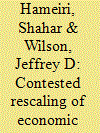| Srl | Item |
| 1 |
ID:
136540


|
|
|
|
|
| Summary/Abstract |
This article argues for a new way of addressing contemporary international law that is more adequate to both vital dynamic trends towards “regionalism” within international law, relations and politics, and the emergent possibility of a far more pluralistic “multipolar” legal order that—in both theory and practice—contrasts markedly with US-dominated hegemonic modes of regulation and high-handed unilateralism. To advance our argument, we draws upon classic Schmittian forms of Grossraum theory concerned to adapt traditional state-centric and purely horizontal conceptual types of international law interpretations to a form of international relations structured around regional ensembles, such as the European Union, NATO, the African Union, and the Shanghai Cooperation Organisation (SCO). These historical trends are emerging out of an encompassing contemporary developmental tendency, including the decline in the traditional nation state posited as having equal status, and both the proliferation of new regional bodies and the strengthening of existing ones. Arguably, the emergence of the SCO from 2001 signals a new phase in multilateralism in the post-Cold War period that, when treated as a case study, allows us to “test out” the credibility of key aspects of Grossraum theory.
|
|
|
|
|
|
|
|
|
|
|
|
|
|
|
|
| 2 |
ID:
136950


|
|
|
|
|
| Summary/Abstract |
The special issue this article opens engages with an apparent conundrum that has often puzzled observers of East Asian politics—why, despite the region's considerable economic integration, multilateral economic governance institutions remain largely underdeveloped. The authors argue that this ‘regionalism problématique’ has led to the neglect of prior and more important questions pertaining to how patterns of economic governance, beyond the national scale, are emerging in East Asia and why. In this special issue, the contributors shift analytic focus onto social and political struggles over the scale and instruments of economic governance in East Asia. The contributions identify and explain the emergence of a wide variety of regional modes of economic governance often neglected by the scholarship or erroneously viewed as stepping stones towards ‘deeper’ multilateralism.
|
|
|
|
|
|
|
|
|
|
|
|
|
|
|
|
| 3 |
ID:
134570


|
|
|
|
|
| Summary/Abstract |
The article attempts to highlight major institutional causes for weaknesses of multilateralism in energy relations between States. In particular, the view defended here focuses on the concept of logic of appropriateness, which helps to conceptualize the level of acceptance of norms and practices. Four various angles of institutions of energy relations are then analyzed: political vs economic angles and rational vs value angles. On these grounds, the case study about the Energy Charter process is then analyzed. In conclusion, the article argues that the Energy Charter process is an explicit attempt to create an international governance, although the issues of acceptance (conflict of appropriateness) is an important barrier to the multilateralism in energy.
|
|
|
|
|
|
|
|
|
|
|
|
|
|
|
|
| 4 |
ID:
136550


|
|
|
|
|
| Summary/Abstract |
Institutions do not always matter. They can make it easier for states to deal with non-traditional security threats and alleviate arms races, but they are less likely to matter in dealing with territorial disputes and negotiating multilateral trade agreements. We should neither overestimate nor underestimate the utility of ASEAN-centered regionalism in the Asia Pacific.
|
|
|
|
|
|
|
|
|
|
|
|
|
|
|
|
| 5 |
ID:
134662


|
|
|
|
|
| Summary/Abstract |
In a discussion of English School approaches to international politics, Barry Buzan suggests that one should look at “how particular states and peoples encounter and adapt to international society.” This essay examines how Canadian governments through their foreign policy practices have encountered and adapted to international society. It starts from a premise that Canadian foreign policy has been integrally linked with international society since the early part of the twentieth century and that international society has done much to influence Canadian foreign policy practice through the years. In turn, this paper discusses how Canadian foreign policy, at times in a very direct and conscientious manner, contributed to the development of international society and how that contribution has changed over time. Finally, this essay argues that an English School lens can provide a constructive interpretation of the significant transition that has occurred in Canadian foreign policy over the past two decades.
|
|
|
|
|
|
|
|
|
|
|
|
|
|
|
|